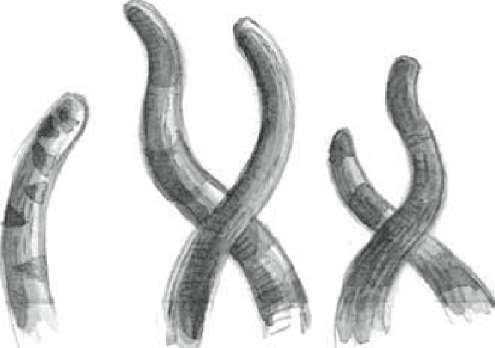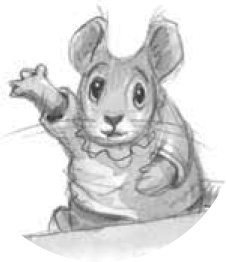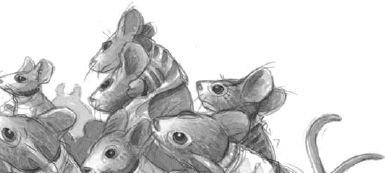Bless this Mouse (3 page)
Authors: Lois Lowry

Hildegarde, recalling this, could imagine the loud clop of horse hooves on the tiled center aisle had the day been rainy last year. But the sun had been brightly shining on the October morning. She and other church mice had watched the event, as they always did, from inside the sanctuary, through peepholes and windows. Several brave adolescents had made their way up into the belfry, and later described the view of the procession from such a high place. The horse, they reported, seemed as small as a mouse; a Saint Bernard was minuscule as they looked down on him; and the catsâthe many, many catsâwere barely visible, just pieces of fluff in children's arms.
Video cameras always whirred in the background, and in recent years the local TV station had sent a cameraman and a reporter, who whispered into a microphone as if she were commenting on a golf tournament. Two years ago the perky reporter, eyes widening in amazement as a large, stately animal led by a woman holding its halter strode past, had murmured into the mike, "My goodness! I believe this is a llama we're seeing!" But the creature's owner, overhearing the reporter, turned with a frown and corrected her tersely. "Vicuña," she said.
It was a memorable, impressive event every October. But Hildegarde and Roderick, praying now for divine protection as the time of the ceremony approached, understood exactly what danger was facing them at the Blessing of the Animals.
The procession and ceremony grew bigger and more disorganized every year.
If it happened to rain, it all moved inside.
Inside was where the population of church mice lived.
And there were always, always cats.

Hildegarde Holds a Meeting

Church mice had inhabited Saint Bartholemew's for generations. Occasionally, during a Great X (the thing they feared most, even more than they feared cats) their numbers would be decimated, for a Great X was a hideous thing and cost many lives. But with their capacityâthe same capacity that Hildegarde was trying now to curtailâfor what she called "incessant reproduction," they always fought back and increased their population once again.
Hildegarde was not wrong to try to limit the numbers. Too many church mice was a very dangerous situation.
Many humans came and went at Saint Bartholemew's: Father Murphy, of course; Miss Vickery, the church secretary; the Altar Guild ladies; Trevor Fisoli, the organist/choirmaster, and his award-winning men-and-boys choir; Alcoholics Anonymous members, who met on Thursday evenings; the sexton; the scoutmaster and his scouts; the visiting bishop; and countless others. Occasionally someone glanced down, saw a mouse, and said something such as "Yikes" or even "Eek." (Or, if it was an Altar Guild lady, particularly Ruth Ellen van Riper, "Oh my GAWD!")
But that would be the end of it. Perhaps the person would say, "There's a mouse in the church." But by then the visible mouse had scampered away and become invisible. People shrugged, chuckled, and forgot.
Ironically, they all thought they were seeing the
same mouse.
It was Hildegarde, actually, who realized that they were making that mistake. She attended an Alcoholics Anonymous meeting on a Thursday night in late September, hidden, of courseâin fact, quite concealed behind a potted plant in the corner of the room. She liked AA meetings because they served cookies and always had a lot of leftovers.
Waiting for them to adjourn so that she could collect their leavings, Hildegarde drowsed a bit (their meetings were very boring, she thought). Then, suddenly, she heard the word "mouse." So she sat upright and listened.
Later she called a meeting of the church mice (just before dawn on Saturday, a time when the building was certain to be empty of humans). They streamed, more than two hundred of them, into Father Murphy's private office. They liked holding their meetings there because of the many bookshelves. Carefully they arranged themselves in rows, each mouse seated in front of the spine of a leatherbound book. Sometimes one of them, overwhelmed by temptation, nibbled at the leather, though there was an unwritten rule against that.
(But never Bibles. The church mice never nibbled Bibles. It would have been unthinkable.)
Hildegarde stood on Father Murphy's desk, next to his calendar (on which she noted
BLESSING OF



ANIMALS
written in red ink and coming up very, very soon) and watched as the population arranged itself.
"Harvey!" she called to a young mouse who was frequently inattentive. "Stop that right now! Don't make a mess of that!"
Harvey twitched his tail and made a face. He was perched on the coffee table in front of Father Murphy's couch, and he'd been poking with interest at an arrangement of playing cards that was laid out there in an unfinished game of solitaire. Sometimes, in the late afternoon, Father Murphy amused himself that way.
Roderick, on the desk near her, saw a way to impress Hidegarde with his intelligence. He whispered, "The red three could go on the black four."
Hildegarde gave him an exasperated look. Then she tapped for silence, using a pencil against the telephone. "The reason I've assembled you," Hildegarde began when they were all comfortably arranged and quiet, "is because Thursday evening I dropped in on an AA meetingâ"
"Oooohh!" squealed a young female named Desirée. "Cookie crumbs, cookie crumbs, cookie crumbs!"
Hildegarde glared at her until she contained herself.
"âand I overheard someone, a woman, say that she had seen a mouse in the ladies' room."
She looked around the office. "This would have been Thursday, about seven p.m.," she reminded them.
"Anyone?" she asked, meaningfully.
No one stirred for a moment. Then, finally, obviously embarrassed, a middle-aged female named Norma raised her paw. "That would have been me. Sorry. I went through the ladies' room because it was a shortcut. I hate making my way around the wiring in that wall."
"Yes, the wiring there is awful. One of us is going to be electrocuted someday," another mouse called from his high perch on a shelf where
The Lives of the Philosophers
were stored.
"I knew there was a meeting going on but I thought AA was all men," Norma explained. "I thought the ladies' room was safe."
"Oh my, no," Hildegarde said. "Half women. Including the church secretary."

"So I was wrong, obviously. And there I was, in the middle of the room, when a woman came in. I scampered away, but I know she saw me. I'm sorry. Is it a disaster? Will it bring on the Great X?" Norma wrung her tiny paws nervously.
A low, frightened murmur made its way around the room.
"Not by itself. But hear me out," said Hildegarde. "The next day, Fridayâthat would be yesterdayâI was in the sacristy, about to take my afternoon napâ"
"She always naps in the sacristy," Roderick interrupted loudly, hoping that all the mice would notice what a close and special relationship he had with Hildegarde. She glared at him. He looked the other way and fell silent.
She continued, "âwhen I overheard the sexton talking to that woman who heads up the Altar Guild. The woman with the ugly hat?"
The church mice nodded their heads and murmured. They all knew the hat. "She's the one who says 'Eek,'" someone said, and they all giggled.
